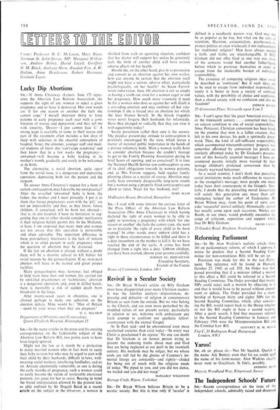EME5 40 VNE
From : Professor H. C. McLaren, Mary Blunt, Norman St. John-Stevas, MP, Margaret Wilkin- son, Andrew Belsey, David Laze!!, Geoffrey H. M. Block, Anthony Hera. A lasdair Fox. A. W. Hakim, Anne Henderson, Robert Hartman, Graham Tayar.
Lucky Dip Abortions
SIR,—If Anna Chataway (Letters, June 17) repre- sents the Abortion Law Reform Association, she supports the right of any woman to reject a given pregnancy and to have it destroyed. Her own words are 'if for one reason or another she feels she cannot cope.' I myself interview thirty to forty patients in early pregnancy each year with a com- bination of nausea and depression; and they tell me with sincerity, 'Doctor—I just cannot face it.' A strong team is available to come to their' rescue and part of the treatment often includes a few days of sleep with sedatives in the cheerful atmosphere of hospital. Sister, the almoner, younger staff and medi- cal students all know this 'can't-cope syndrome' and they know that in a few weeks the pregnancy-- unwanted—will become a baby kicking in its mother's womb, gradually and surely to be welcomed at its birth.
The alternative, a social abortion, quite apart from the moral issue, is a dangerous and depressing operation; depressing both for the patient and the surgeon.
To answer Anna Chataway's request for a form of certain contraception, may I describe my own practice? After the so-called 'unwanted' baby is born, the father, the mother and I meet privately. I put it to them that future pregnancies, even with the 'pill,' are not an impossibility and that, as they know, future children, if conceived, will be born not aborted— that is, in this hospital. I have no hesitation in sug- gesting that one or other should consider sterilisation if their religious beliefs permit this. In the Midlands, at least, I am surprised that many men and women are not aware that this operation is permissible and often advisable. The important difference in these post-delivery interviews is the lack of tension which is so often present in early pregnancy when the question of abortion may be discussed.
If the law on abortion is altered, without a doubt there will be a massive refusal to kill babies for social reasons by the gynaecologists. If so, state-paid aborters will have to be trained and given proper facilities.
Many gynaecologists may, however, feel obliged to help train these men and women, for, carried out by unskilled practitioners or 'technicians,' abortion is a dangerous operation, and, even in skilled hands, there is inevitably a risk of sudden death from blood-clot in the lungs.
After twenty-seven years in obstetrics, one is allowed perhaps to make one aphorism on the abortion debate. Mine would be : 'Men of Britain —stand by your wives when they are pregnant.'
H. C. McLAREN
Department of Obstetrics and Gynaecology, Queen Elizabeth Hospital. Birmingham 15














































 Previous page
Previous page